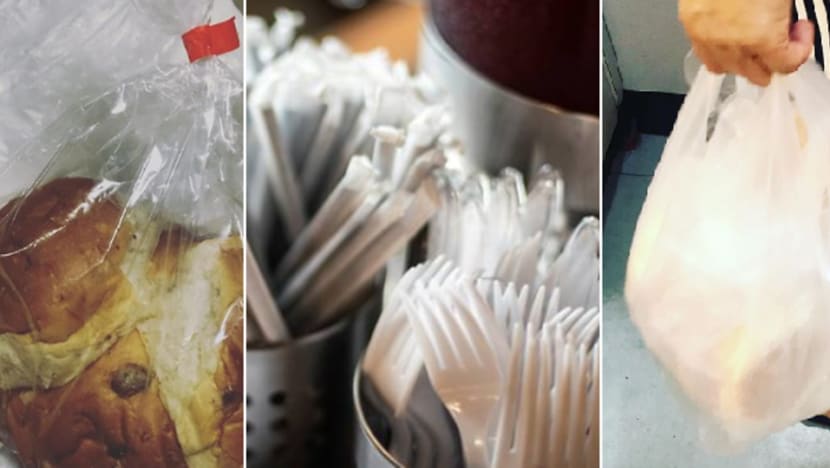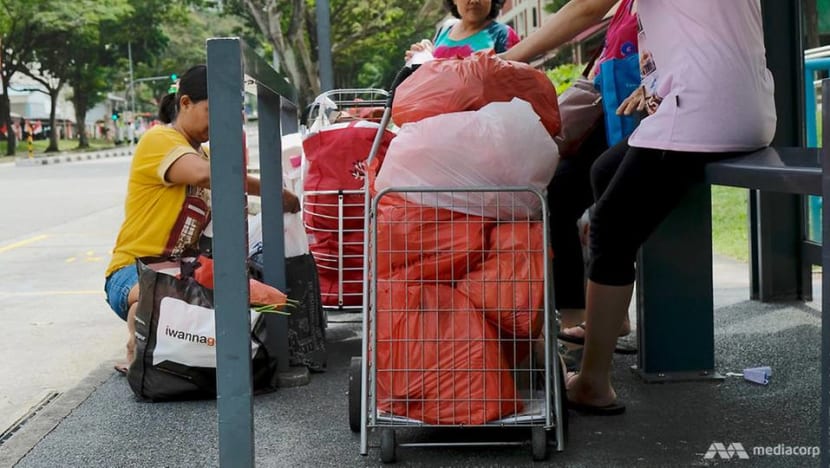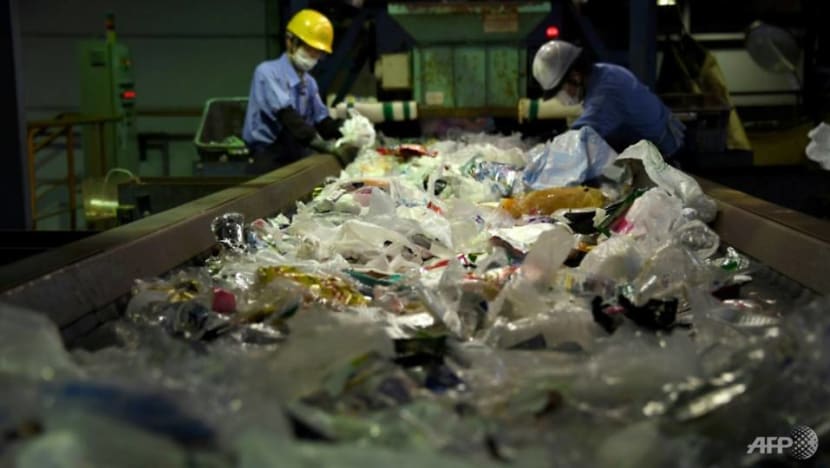commentary Commentary
Commentary: Wasteful practices of affluence must stop
Let’s consider a set of new 3Rs for environmental sustainability – namely, reinvention, recalibration and reward, says Nominated Member of Parliament Professor Lim Sun Sun.

Composite picture of aflluence's extravagance. (Photos: Instagram/tabao girl and AFP)
SINGAPORE: One of my favourite Instagram accounts is that of Tabao Girl’s. This environmentally minded young woman meticulously photographs the efforts she makes daily to reduce her use of disposables.
On most days, she succeeds remarkably with her inspiring arsenal of reusable cups, containers, and cutlery, and enjoys her take-away food like the rest of us.
But one day in July this year, she recounted in a post her distressing experience at a bakery, while waiting behind another customer: “…when he was done paying, I was almost going to cry. First the 13 buns, each in 1 plastic bag of its own. Then he wanted 6 buns in 1 bag, and 7 buns in another – and he wanted them double-bagged. Then he asked the cashier to give him 1 large bag to put everything into. In 1 bakery trip for 13 buns, there was a total of 18, EIGHTEEN PLASTIC BAGS used in 1 single transaction.”
I share her distress when I witness such scenes in bakeries, hawker centres and supermarkets.
It seems that as consumers, we have become so precious that food items must be individually packed for fear that they come into contact with each other. Heaven forbid that we allow our floss buns to defile our chocolate croissants!
READ: Commentary: We are on the cusp of a plastic recycling revolution
READ: Commentary: Dear Singapore, a plastic future is not fantastic
Indeed, I often find it difficult to advise service staff that I do not wish to have my breads individually packed, and that I have no need for disposable cutlery.
Many look at me with annoyance, as if I have disrupted their well-established work processes. I do not fault them.
The broader structural factors we all labour under are norms set in place by industries, and consumer expectations which have been shaped as a result.

HAVE THE 3RS BECOME TRITE?
Earlier this week, the Singapore Government passed the new Resource Sustainability Bill. In the face of scorching temperatures, environmental degradation and climate change, an entirely new bill to address these critical issues is a concerted step towards ridding our society of some damaging practices.
We in Singapore have become so well-acquainted with the 3Rs – reduce, reuse and recycle — to the point that they have become somewhat trite and lost valuable traction.
In truth, although many of us try hard to practise these 3Rs, it seems like broader structural factors and norms work against our best efforts.
Companies are keen to win over customers and see offering individual packaging and free bags as good service. Consumers are in turn trained to expect and demand such provisions and this vicious cycle perpetuates itself countless times, every single day.
Over time, such norms and expectations result in mountains of trash and ingrain in our people wasteful habits that generate more rubbish than we can handle. These harmful norms and expectations exist not only in F&B, but in virtually every industry.
NEW 3RS: REINVENT, RECALIBRATE AND REWARD
I therefore propose an alternative set of 3Rs that can take environmental sustainability at institutional and individual levels to a higher plane. In addition to reduce, reuse and recycle therefore, we must strive to reinvent, recalibrate and reward.

READ: Commentary: Climate action is our generation’s 1965
The Resource Sustainability Act will be an excellent initiative with regard to reinvention. By requiring that those who profit from the supply of products be responsible for collecting and treating these products when they become waste, companies will be more cognisant of downstream effects of their commercial activity.
This will motivate them to invest more heavily in reinventing their products so that waste generation is minimised.
On the specific issue of e-waste that the bill seeks to address, technology companies have for too long practised planned obsolescence to boost consumer demand.
They design lifespans of products such as smartphones and laptop computers other electrical appliances to be artificially short, so that consumers are forced to ditch functional products and acquire new ones.
Some devices are also designed to be difficult to repair, or with replacement parts that are tightly controlled by the company, thereby making it challenging to extend their lifespan through replacing faulty parts.
Device repair services have also become few and far between such that consumers find it easier to buy a whole new device.
LISTEN: The Pulse: The iPhone 11 and the outlook for Apple
In contrast, consider the Dutch social enterprise Fairphone which produces smartphones that have significantly less environmental impact. Fairphones are designed to be easy to open, repair and upgrade.
For example, Fairphone owners can unscrew their phones and replace the cameras, thereby enjoying the latest technology without having to buy an entirely new phone.

READ: Commentary: We discard things rather than fix them. Here's why that should change
Their phones are designed to last for at least five years, more than twice the standard 24 month-smartphone replacement cycle.
Examples such as Fairphone show us that resource sustainability is achievable through reinvention, especially if we introduce the right levers.
Governments and consumer advocacy groups worldwide can do more to combat the exploitative practice of planned obsolescence, as well as introduce regulations to strengthen consumers’ rights to repair their electrical and electronic products.
RECALIBRATING
The next R we must act upon is to recalibrate. It is time we recalibrate people’s expectations for what constitutes excellent service and warm hospitality.
Singapore seems to have transformed into a society where events must involve goody bags, bottled water and an oversupply of catered food. Consequently, our homes have been filled with SWAG – stuff we all get – that we later dump into landfills after engaging in Marie Kondo inspired spring cleaning.
Thankfully, these norms need not be cast in stone. Collectively, we can forge fresh norms that help to advance resource sustainability.
READ: Commentary: When that funpack becomes too much fun for our planet

Conference organisers should dispense with goody bags, hotels can do away with small toiletries bottles and bakeries must discontinue this practice of wrapping buns in individual bags.
Every industry can identify positive disruptions that can enhance environmental sustainability by maximising resources and minimising waste. Once we create new norms, we recalibrate consumer expectations, and change behaviour for the better.
REWARDING
Finally, the third R is to reward. Beyond punitive measures that clearly have their place in our ecosystem, we must also consider introducing more schemes to reward companies and consumers for their efforts to go green.
As the recent study by the Singapore Environment Council on building a circular food economy revealed, an estimated S$2.54 billion of food loss occurs in Singapore from farm to market annually. This astounding loss must be addressed.
We need to introduce more incentive schemes for companies to invest in technology to extend the shelf-life of food items.
READ: The single-use coffee cup is generating a mountain of waste, a commentary

We also have to encourage different players within the food supply chain to collaborate on practical solutions to stemming food waste.
We should also develop Singapore as a centre where we specialise in innovations to transform food waste streams into valuable by-products such as new food items, animal feed or compost.
By rewarding such investments, collaborations and innovations, we can steer companies towards greater resource sustainability.
Similarly, on the consumer level, we can introduce schemes to change consumer behaviour. Those who choose options with smaller carbon footprints can be rewarded with loyalty points that translate into discounts.
Similarly, consumers can be encouraged to reward companies that offer more green alternatives through rating and voting systems.
We are all drowning in the effluents of affluence. The time to act is now.
Lim Sun Sun is Professor of Communication and Technology and Head of Humanities, Arts and Social Sciences at the Singapore University of Technology and Design. She is also a Nominated Member of Parliament and Board Director of the Singapore Environment Council.












